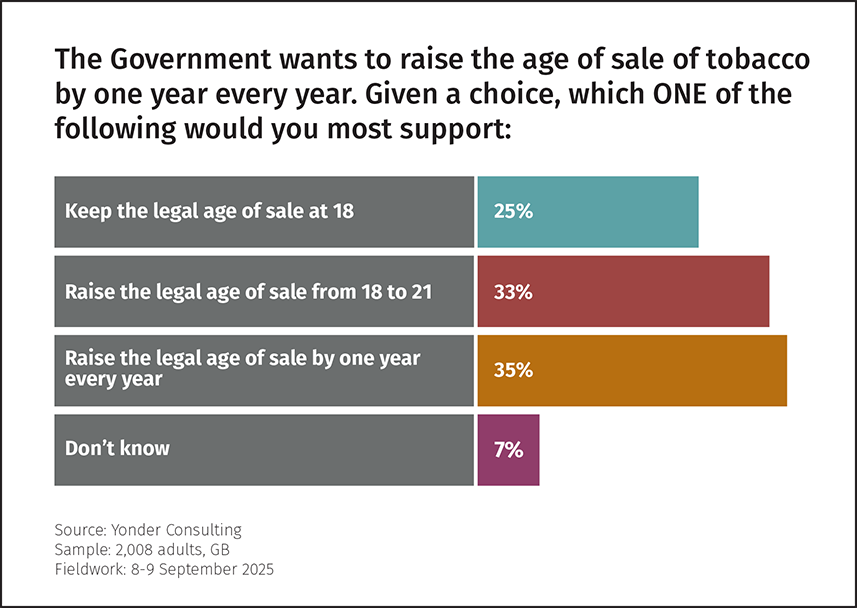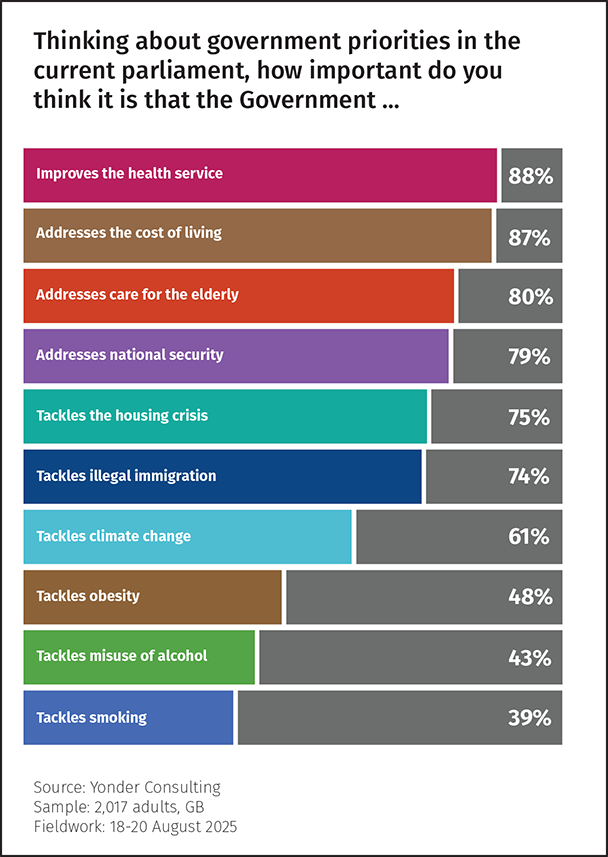The people have spoken but is anyone listening?
In August and September Forest commissioned a series of polls from Yonder Consulting.
Each survey interviewed a nationally representative sample of at least 2,000 GB adults online, and below is a summary of the results which are published today to coincide with the start of the committee stage of the Tobacco and Vapes Bill in the House of Lords.
But, first, a couple of things are worth pointing out. One, the idea peddled by ASH, based on a poll conducted by YouGov, that a significant majority (around 70%) support a generational ban on the sale of tobacco, is only true if you adopt a two-dimensional, black and white, view of the world.
They pulled the same trick prior to MPs voting for the workplace smoking ban. Respondents were asked whether or not they supported a smoking ban and, given a simple yes/no option, a majority said yes, which was hardly surprising given the overwhelming majority, even 20 years ago, were either non-smokers or guilt ridden smokers.
(A year after the ban was introduced – and I’ve never forgotten this – a senior exec at British American Tobacco stood up at a stakeholder meeting and said he was happy to smoke outside pubs because he had always felt bad about smoking his cigar, natch, indoors, and he could now light up without that feeling of guilt. Today, of course, anti-smoking campaigners are clamouring to ban smoking in beer gardens as well. No doubt he will find some way to welcome that too, if the company’s beloved vapes are exempt.)
But I digress. The point is, if you offer respondents more than two diametrically opposed options that inevitably polarise (and simplify) the debate, you get a very different outcome. For example, prior to the workplace smoking ban, we asked respondents to choose between FOUR options:
A – smoking allowed throughout
B – smoking allowed but with smoke free areas
C – smoking allowed but only in designated smoking rooms
D – smoking prohibited throughout
If I remember correctly, only 6% supported A, and less than a third (30%) supported D. I think C, with around 45%, had the most support, but it was clear the majority of people were opposed to a complete ban, which is what MPs voted for.
The same is true of polls concerning a generational ban. As I say, ASH would have us believe the public is firmly in favour of raising the age of sale by one year every year. Again, I imagine respondents were given a yes/no type of question. (I haven’t seen the question because ASH hasn’t published it.)
In surveys conducted by Yonder for Forest, respondents are asked questions that gave them a more nuanced choice. For example:
‘The Government wants to raise the age of sale of tobacco by one year every year. Given a choice, which one of the following would you most support: keep the legal age at 18, raise the legal age of sale from 18 to 21, raise the legal age of same by one year every year, or don’t know.’ You’ll find the result below but it won’t surprise you to know that the picture is very different to the one drawn by ASH.
Anyway, here’s a brief summary of the answers to the ten questions that feature in Public Attitudes to Tackling Smoking and the Tobacco and Vapes Bill, published today:
Three out of five respondents (59%) believe that individuals who are legally adults at 18 should be permitted to purchase cigarettes and other tobacco products.
Given a choice of keeping the legal age of sale of tobacco at 18, raising it to 21, or introducing a generational ban, a majority (58%) support alternatives to a generational ban.
A majority (57%) believe that a generational ban will drive MORE consumers to the black market and other sources of illegal tobacco. Only 13% believe it will not have that impact.
A majority (67%) believe that the tax on tobacco - which currently represents over 80% of the total price of a pack of cigarettes in the UK - is about right or too high. Only 21% consider it too low.
A significant majority (67%) believe that purchasing illegal tobacco is an understandable response from consumers faced with the high cost of tobacco bought legally in the UK. Only 21% think it is not understandable.
The public believe that government has more pressing priorities than tackling smoking – improving the health service, for example, or tackling the cost of living. Given a list of ten issues, ‘tackling smoking’ came last.
Similarly, in relation to the National Health Service, 88% believe the most important priorities are addressing ambulance response times, and improving waiting times for treatment. Fewer than half (42%) think that ‘tackling smoking’ is important.
According to respondents, the most important bills currently progressing through the UK Parliament are the Crime and Policing Bill, the Border Security, Asylum and Immigration Bill, and the Children’s Wellbeing and Schools Bill. The Tobacco and Vapes Bill and the House of Lords (Hereditary) Bill are considered the least important.
The public is split on whether policies to reduce smoking rates have gone too far, far enough, or not far enough - 38% believe they have gone far enough, while 40% believe they have not gone far enough; 11% believe they have gone too far.
A majority (56%) believe the impact of existing tobacco control policies should be independently reviewed before further measures are introduced; 15% disagree.
You can download and read the full report here. Draw your own conclusions.
Chris Snowdon has some thoughts on the matter here – Tobacco prohibition and public opinion.
See also: Majority support alternatives to generational tobacco ban


